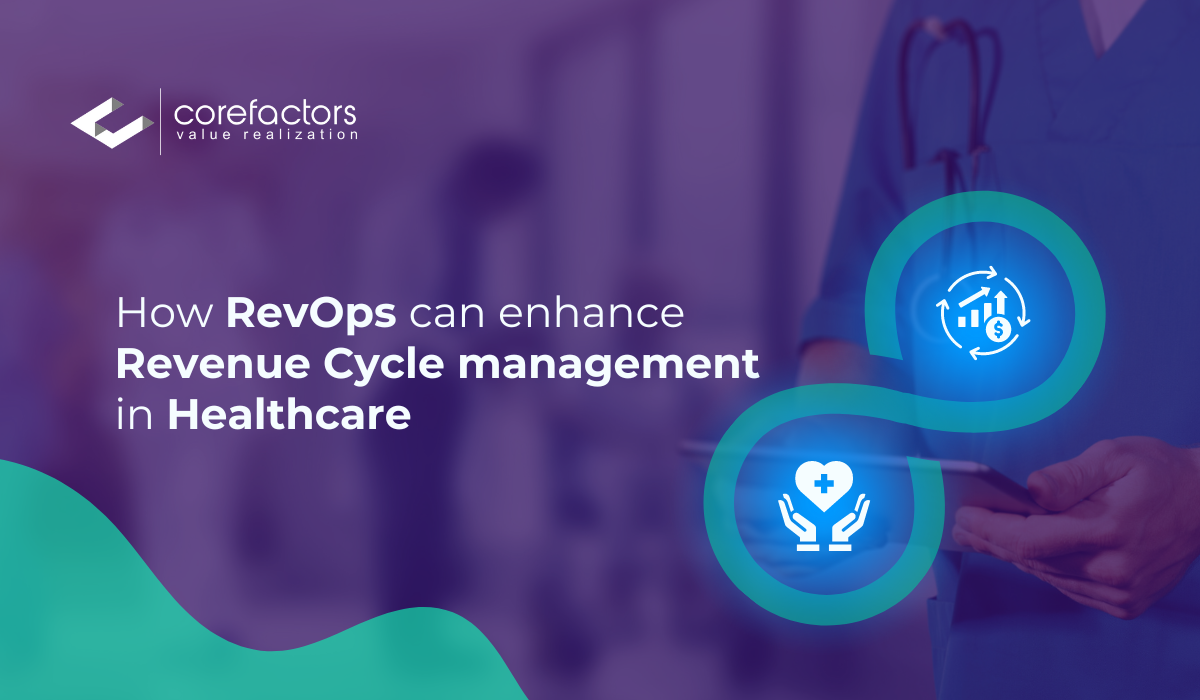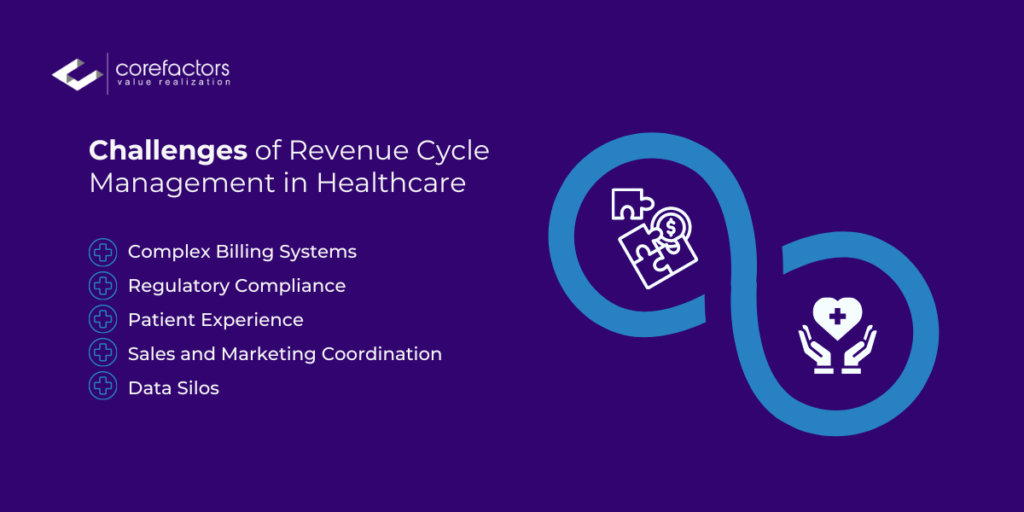
Revenue cycle management (RCM) is the backbone of financial stability in various industries, including healthcare, fintech, education, non-profit, automotive, and real estate. In healthcare, encompassing hospitals, lab service providers, pharmaceuticals, and medical equipment distributors, effective RCM is crucial for sustaining operations, investing in new technologies, and delivering high-quality care. As the healthcare landscape grows more complex with increasing regulations, tighter margins, and higher patient expectations, traditional RCM approaches often fall short. This is where Revenue Operations (RevOps) comes into play, offering a modern, integrated approach that can revolutionize how healthcare organizations manage their revenue cycles.
Understanding the Role of RevOps in Healthcare
Revenue Operations, or RevOps, is a strategic approach that aligns sales, marketing, and customer service functions to drive revenue growth. In the healthcare industry, RevOps takes on an even broader role by integrating various operational processes to optimize revenue generation. The core idea behind RevOps is to break down the silos that typically exist within the organization, ensuring that all departments work towards a common goal: maximizing revenue while delivering exceptional services.
In healthcare, RevOps is not just about improving financial outcomes; it’s about enhancing the overall efficiency of the organization. Whether it’s a hospital managing patient billing and appointments, a lab service provider processing tests, a pharmaceutical company navigating complex pricing models, or a medical equipment distributor coordinating sales, RevOps brings together all the moving parts to create a seamless, efficient operation.

The Challenges of Revenue Cycle Management in Healthcare
Healthcare organizations face numerous challenges in managing their revenue cycles. These challenges are often exacerbated by the fragmented nature of traditional RCM processes:
- Complex Billing Systems: Hospitals and other healthcare providers often struggle with intricate billing systems that require precise coding and documentation. Errors in these processes can lead to claim denials, delayed payments, and financial instability.
- Regulatory Compliance: The healthcare industry is heavily regulated, and staying compliant with constantly changing laws and regulations can be daunting. Non-compliance can result in hefty fines and damage to the organization’s reputation.
- Patient Experience: Patients today expect transparency and efficiency in their interactions with healthcare providers. Poor billing practices, confusing payment options, and long wait times for appointments can lead to dissatisfaction and lost revenue.
- Sales and Marketing Coordination: Medical equipment distributors and pharmaceuticals often face challenges in coordinating sales efforts with marketing strategies. Without proper alignment, these efforts can become disjointed, leading to missed opportunities and lower revenue.
- Data Silos: Many healthcare organizations suffer from data silos, where different departments do not share information effectively. This lack of integration can result in inefficiencies, errors, and missed revenue opportunities.
How RevOps Transforms Revenue Cycle Management
RevOps addresses these challenges by creating a unified, data-driven approach to revenue cycle management. Here’s how RevOps can enhance RCM across various healthcare sectors:
- Automation of Sales and Billing Processes: RevOps emphasizes the use of automation to streamline sales and billing processes. Hospitals can automate patient billing, reducing manual errors and speeding up the claims process. Lab service providers can automate test billing, ensuring timely reimbursements and reducing administrative overhead. For pharmaceuticals and medical equipment distributors, automated sales pipelines and billing systems can lead to more efficient operations and higher customer satisfaction.
- Streamlined Appointment Management: Efficient appointment management is crucial for healthcare providers. RevOps integrates advanced scheduling tools that automate appointment bookings, send reminders, and optimize resource use. This reduces no-shows and ensures that healthcare providers can maximize their revenue potential by keeping their schedules full.
- Enhanced Marketing and Customer Support: RevOps aligns marketing and customer support efforts, ensuring that healthcare organizations can effectively target and engage their audiences. Hospitals can run automated marketing campaigns to attract more patients, while lab service providers can tailor their messaging to specific demographics. Medical equipment distributors can optimize their marketing strategies to reach the right customers, and pharmaceuticals can ensure consistent and compliant communication with healthcare providers. Additionally, integrated customer support tools enable organizations to resolve inquiries quickly, improving customer satisfaction and loyalty.
- Data-Driven Insights: RevOps relies on data analytics to provide actionable insights into revenue cycle performance. Healthcare organizations can monitor key metrics such as claim denial rates, patient payment trends, and sales performance. This data-driven approach enables organizations to identify inefficiencies, optimize their processes, and make informed decisions that enhance revenue.
- Improved Collaboration: RevOps fosters a culture of collaboration across departments, breaking down the silos that traditionally hinder efficiency. In a hospital setting, this means better coordination between billing, finance, and patient care teams. Lab service providers benefit from enhanced collaboration between clinical and administrative teams, ensuring that billing is accurate and timely. Medical equipment distributors and pharmaceuticals see improved alignment between sales, marketing, and compliance teams, leading to more cohesive and effective operations.
- Compliance and Risk Management: Compliance is a major concern in healthcare, and RevOps integrates compliance monitoring into the revenue cycle. This ensures that all billing, marketing, and sales activities adhere to industry standards, reducing the risk of fines and penalties. For hospitals, this means avoiding costly mistakes that could lead to financial losses. Lab service providers, medical equipment distributors, and pharmaceuticals also benefit from this integrated approach, ensuring that they operate within the bounds of regulatory requirements.
The Future of RevOps in Healthcare
As healthcare continues to evolve, the adoption of RevOps will become increasingly important. The focus will be on further integrating technology, such as artificial intelligence and machine learning, into RevOps strategies. These technologies will enable even greater automation, more accurate data analysis, and more precise decision-making.
RevOps is not just a trend but a strategic necessity for healthcare organizations looking to thrive in a competitive and complex environment. By aligning sales, marketing, and customer support functions, and by leveraging data and automation, RevOps can help healthcare organizations optimize their revenue cycles, improve patient satisfaction, and ensure compliance with regulations.
Conclusion
RevOps is transforming the way healthcare organizations manage their revenue cycles. By automating key processes, improving collaboration, and providing data-driven insights, RevOps enables hospitals, lab service providers, pharmaceuticals, and medical equipment distributors to operate more efficiently and effectively. As the healthcare industry continues to face challenges, the adoption of RevOps will be critical in ensuring that these organizations can continue to deliver high-quality care and services while maintaining financial stability.











